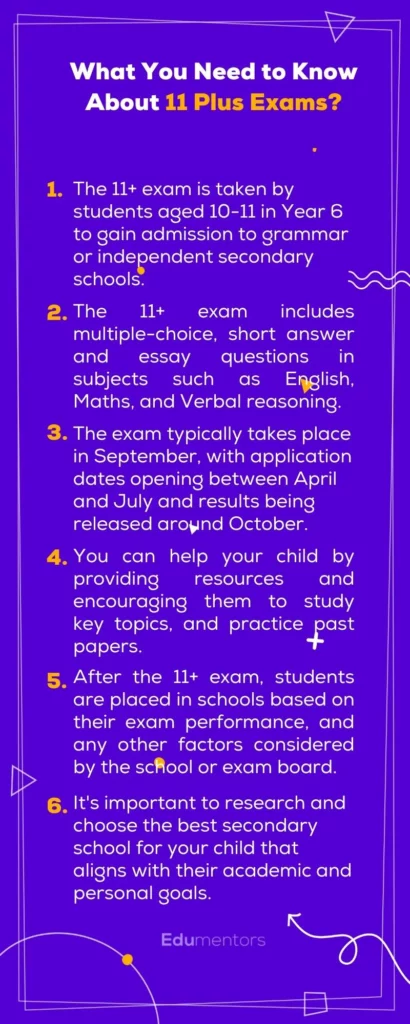Table of Contents
- What are 11 Plus Exams?
- Who Can Take 11+ Exam?
- Deadlines for Registering for the Exam
- What Percentage of Pupils Pass the 11 Plus?
- When are 11 Plus Exams in 2024
- How to Prepare Your Child for 11+ Exams
- The Format of 11 Plus Exams
- When Do 11 Plus Exam Results Come out in 2023
- Exam Results and Next Steps
- Common Concerns and Misconceptions
What are 11 Plus Exams?
The 11 plus exam, also known as the Eleven Plus or the Entrance Examination, is a crucial test for students in the UK who are seeking admission to selective secondary schools. This exam is designed to assess a student’s ability and aptitude in various subjects. These include maths, English, and reasoning. The results of the 11+ exam are used by many secondary schools to determine which students will be offered a place in their program.
For parents, the 11+ exam can be a source of stress and uncertainty. It is important to understand the purpose and format of the exam, as well as the best ways to prepare for it.

Who Can Take 11+ Exam?
The 11+ exam is typically open to students who are currently in their last year of primary school, or Year 6. Some areas may also allow students in Year 5 to take the exam. It’s important to check with your local schools and education authorities to confirm the eligibility requirements for your area.
The 11+ exam is offered in various regions of the United Kingdom, including England, Wales, and Northern Ireland. However, it is not offered in Scotland, where a different system is used for secondary school admission.
Deadlines for Registering for the Exam

The deadlines for registering for the 11+ exam can vary greatly depending on the location and the school or examination board administering the test. Generally, registration for the 11+ exam can open as early as May, with registration periods typically open for a couple of months from the start date. Deadlines can range from July to October, so it is important to check.
In some regions, the registration process for the 11+ exam may start in April or May for the following academic year, with parents needing to register their child by June, July or August.
What Percentage of Pupils Pass the 11 Plus?
Approximately 30% of pupils pass the 11+ exam, with variations depending on the region and the specific exam board.
| Year | Number of students who passed the 11-plus exam |
|---|---|
| 2022 | 58,717 |
| 2021 | 59,758 |
| 2020 | 62,268 |
| 2019 | 61,511 |
| 2018 | 60,191 |
What is the Pass Mark for 11 Plus?
The pass mark for the 11-plus exam typically varies, depending on the specific school or local authority. On average, it’s around 80%, meaning a child must correctly answer about 80% of the questions to pass. However, this can be higher, especially in areas with highly selective schools.
Factors influencing the pass mark include the:
- exam’s difficulty
- the number of students taking it,
- the availability of school places
- the school’s admissions policy
For personalised advice regarding your child’s chances, it’s best to consult their teacher or the school’s admissions officer.
Here is the pass mark for some schools in 2023:
| School | Pass mark |
|---|---|
| Tiffin Girls’ School | 121 |
| King’s College School | 119 |
| Henrietta Barnett School | 118 |
| St Paul’s Girls’ School | 117 |
| The Westminster School | 116 |
When are 11 Plus Exams in 2024
For most grammar schools, the 11+ exam will take place in September 2024, typically within the first two weeks of the month. However, it’s important to note that there may be some variations in the exact date, so it’s recommended to check with your specific school(s) for confirmation.
How to Prepare Your Child for 11+ Exams
There are many study materials available for the 11+ exam, including practice books, past papers, and online resources. It’s important to choose materials that are specifically designed for the 11+ exam and are up-to-date. Some popular choices include CEM 11+ practice books, GL Assessment 11+ practice papers, and the Bond 11+ series.
It’s important to set a study schedule and stick to it. Students should focus on building their skills in maths, English, and reasoning. It’s also important to take regular practice exams to build test-taking stamina and to become familiar with the format and style of the 11+ exam.
Taking practice exams is one of the most effective ways to prepare for the 11+ exam. Practice exams will give students an idea of the types of questions they can expect on the actual exam, and will help them to identify any areas where they may need additional practice.
Some students may benefit from extra help, such as tutoring or extra classes. Tutors can provide personalised instruction and feedback. They can help students to focus on their weaknesses. Parents can also consider online resources, such as online practice tests, educational games, and interactive learning tools.
The Format of 11 Plus Exams
The most common 11+ exam formats are GL, CEM, CSSE, SET, ISEB, and Private School written format. For example, CEM format consist of three sections: English, Verbal Reasoning, Non-Verbal Reasoning, and Numerical Reasoning.
There are two different formats for 11+ exam papers: Standard format – where children write their answers on the test paper and Multiple-choice format – where answers are marked in a separate answer booklet. The 11+ exam papers are timed, usually last between 45-60 minutes and children should practice with timed 11+ exam mock test.
It is important to note that the format of the 11+ exam can vary depending on the region and the school or examination board administering the test. Parents and students should check with local schools and examination boards for specific format and structure of the test.
When Do 11 Plus Exam Results Come out in 2023
In October 2023, most grammar schools will announce the results of the 11+ exam around mid-month. On March 1st 2024, school allocations will be confirmed and in September of the same year, the new intake will begin Year 7 at each of the 164 grammar schools.
Exam Results and Next Steps
Understanding and Interpreting Exam Results
After the 11+ exam, students will receive their results. The results will typically include scores for each subject, as well as an overall score. It’s important to understand how the scores are calculated, and what the scores mean in terms of a student’s performance on the exam. Parents and students should also be familiar with the minimum scores required for admission to specific schools.
Choosing a Secondary School
Once the results are received, students will typically have a choice of schools to attend. It’s important to research different schools and their programs and to visit the schools before making a final decision. Factors to consider when choosing a school include the school’s reputation, location, and programs offered. Here is a full guide on choosing a secondary school.
Appealing Exam Results or Seeking Alternative Options:
If a student is unhappy with their exam results, they may have the option to appeal the results or seek alternative options. This could include taking the exam again, or applying to schools that do not require the 11+ exam for admission. It’s important to check with the relevant authorities for the specific appeal process and alternative options in your area.
Preparing for Secondary School
Once a school has been chosen, it’s important to start preparing for the transition to secondary school. This could include familiarising yourself with the school’s policies and procedures, and preparing for the start of classes.
Common Concerns and Misconceptions
Many parents and students have concerns about the 11+ exam, such as feeling overwhelmed by the material, not being able to finish the exam on time, or not being able to score well enough to be admitted to their desired school. It’s important to remember that the 11+ exam is just one factor in the admissions process. Many schools consider other factors such as interviews, essays, and extracurricular activities.
There are many misconceptions about the 11+ exam, such as that it is only for the academically gifted, or that the only way to prepare for the exam is to attend expensive tutoring classes. In reality, the 11+ exam is open to all students, regardless of their academic background. While additional help and preparation can be beneficial, it is not a requirement to score well on the exam.
Conclusion
The 11+ exam is a significant event for many families, and it’s important to stay informed and prepared. By understanding the exam format and requirements, setting a study schedule, and staying focused on their goals, students can increase their chances of success.
For more information on the 11+ exam, parents and students can consult their local schools and education authorities, as well as online resources such as the official 11+ exam website, or websites of schools that offer 11+ exam.
Parents can assist their children with their 11+ revision, but for additional support, seeking guidance from tutors is an option. There are various tutoring services available, one of which is Edumentors. The 11 plus tutors at Edumentors go through a thorough interview and qualification process, and have excelled in their GCSEs and A-levels, and are currently studying at prestigious universities in the UK such as Oxford and Cambridge.







